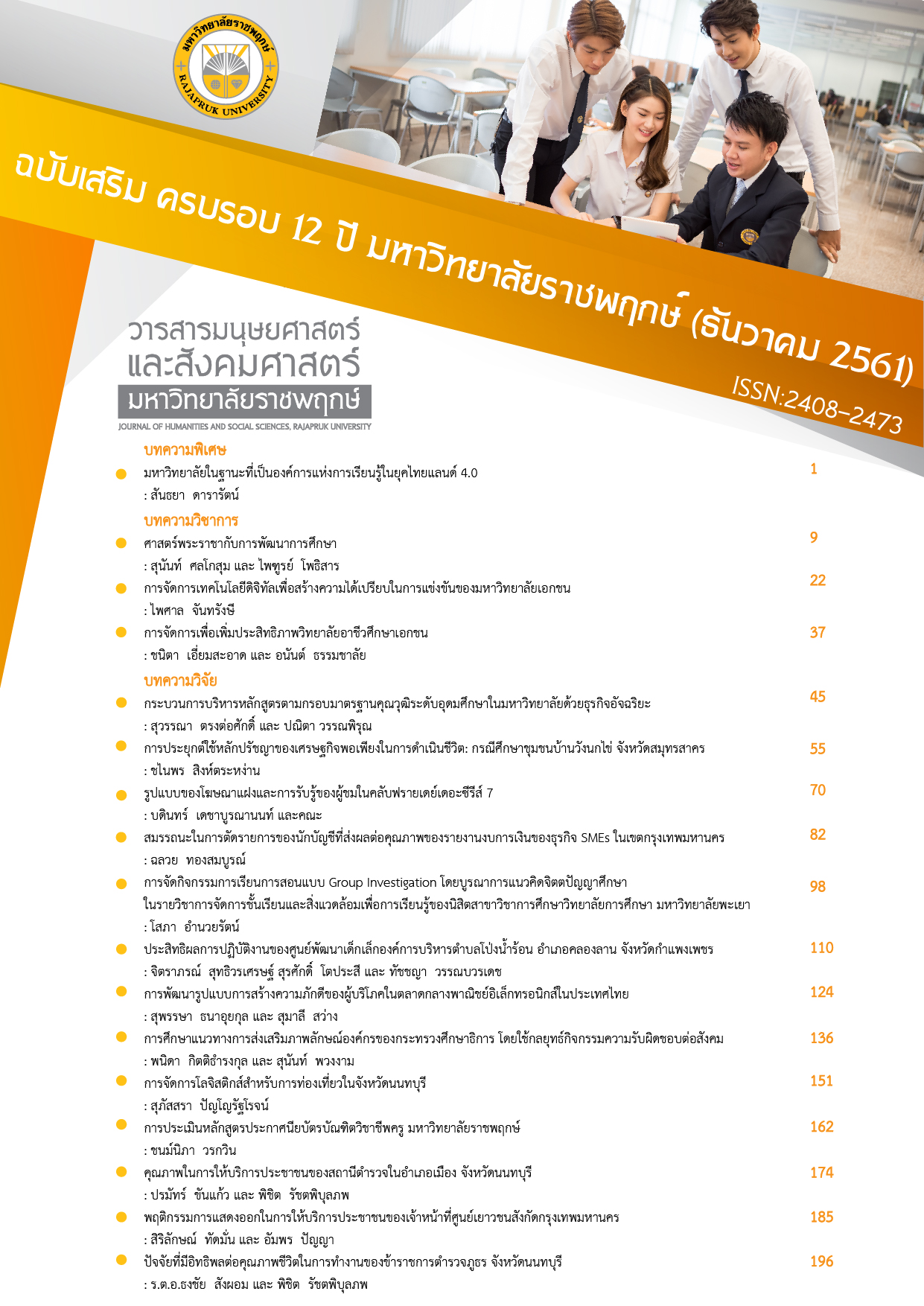The Effects of Learning and Teaching Activity Management Using Group Investigation by Integrating Contemplative Education in the course Classroom Management Course and Learning Resource Centre for Education Program, School of Education, University of Phayao
Main Article Content
Abstract
The purpose of this research was to investigate the effects of learning and teaching activity management using Group Investigation by integrating contemplative education in Classroom Management Course and Learning Resource Centre for Education Program students, School of Education, University of Phayao. The population of this study were 60 students who enrolled in the course Classroom Management and Learning Resource Centre, Education Program, School of Education, University of Phayao, in the third semester, academic year 2015 (AEC). The research instruments were the questionnaires of learning and teaching activity management and were analyzed by using means (m) and standard deviation (σ), and learning log of students which was analyzed by using content-based analysis. The results of the study showed that; 1) the effects of learning and teaching activity management, the overall result was in a high level and, when comparing each aspect, the aspect “the learners were able to express their opinions reasonably and creatively” was in the highest level and; 2) the effects for the management of four learning and teaching activities revealed that it was very useful for the learners, and the learners were able to practice thinking skill, concentration, to plan for their future, to listen to ideas from others, to understand better to improve, to enjoy to join the activities, and had no stress.
Article Details
References
กาญจนา สายพิมพ์. (2556). กระบวนการส่งเสริมจิตสาธารณะตามแนวจิตตปัญญาศึกษาของนักเรียนชั้นประถมศึกษาปีที่ 3. วารสารวิชาการศรีปทุม, 9(4) เมษายน - มิถุนายน 2556: 47 - 55.
พิเชษฐ์ พินิจ และ อนุศิษฏ์ อันมานะตระกูล. (2558). กระบวนการจัดการเรียนรู้แนวจิตตปัญญาศึกษาในรายวิชาการเขียนเชิงวิชาการ. ภาควิชาครุศาสตร์เครื่องกล คณะครุศาสตร์ อุตสาหกรรมและเทคโนโลยี มหาวิทยาลัยเทคโนโลยีพระจอมเกล้าธนบุรี, กรุงเทพ: จรัญสนิทวงศ์การพิมพ์.
วิไล พิพัฒน์มงคลพร. (2554). การพัฒนากระบวนการจัดการเรียนการสอนกลุ่มสาระการเรียนรู้ภาษาไทย โดยใช้นวัตกรรมการศึกษาชั้นเรียน (Lesson Study) และการจัดการเรียนรู้ตามแนวคิดจิตตปัญญาศึกษา (Contemplative Education). รายงานการวิจัย. คณะศึกษาศาสตร์ มหาวิทยาลัยขอนแก่น.
ศูนย์จิตตปัญญาศึกษา. (2552). เอกสารวิชาการการเรียนรู้สู่การเปลี่ยนแปลงจิตตปัญญาศึกษามหาวิทยาลัยมหิดล. นครปฐม: Century Co., Ltd.
สลักจิต ตรีรณโอภาส. (2553). จิตตปัญญาศึกษากับการจัดการเรียนรู้. ค้นเมื่อ 19 พฤศจิกายน 2559, จาก http://edu.psru.ac.th/2011/pdf/jitta.pdf
สนิท สัตโยภาส. (2554). การใช้กระบวนวิชาจิตตปัญญาศึกษา (Contemplative Studies) หมวดวิชาศึกษาทั่วไป พัฒนาคุณธรรม จริยธรรมและค่านิยมอันพึงประสงค์แก่นักศึกษาระดับปริญญาตรี มหาวิทยาลัยราชภัฏเชียงใหม่. รายงานการวิจัย มหาวิทยาลัยราชภัฏเชียงใหม่.
สุรศักดิ์ หลาบมาลา. (2550). หลักการสอน . กรุงเทพฯ: จุฬาลงกรณ์มหาวิทยาลัย.
Contemplative Education Center. (2009). Academic textbook: Learning for a change to contemplative education, Mahidol University. Nakorn Pathom: Century Co., Ltd. (in Thai)
Labmala, S. (2007). Teaching principle. Bangkok: Chulalongkorn University. (in Thai)
Pinit, P., & Anmanatarkul, A. (2015). Learning management based on contemplative education for academic writing course, Mechanical Technology Education, Faculty of Industrial Education and Technology, King Mongkut's University of Technology Thonburi. Bangkok: Charansanitwong Printing. (in Thai)
Pipatmongkolporn, W. (2011). The develop teaching and learning process in the Thai Language by the Lesson Study Approach and basing on the ideas of Contemplative Education, Research article, Faculty of Education Khon Kaen: Khon Kaen University University. (in Thai)
Saipim, K. (2013). The process of contemplative education to promote public mind of prathomsuksa students in grade 3. Sripatum Chonburi Journal, 9(4) April - June 2013, 47 - 55. (in Thai)
Satyopas, S. (2011). Using contemplative studies learning management to develop virtue, morality and needed characteristics for Bachelor’s Degree students of Chiang Mai Rajabhat University. Research: Chiang Mai Rajabhat University. (in Thai)
Triranaopas, S. (2010). Contemplative education and learning management. Retrieved November 19th, 2016, from http://edu.psru.ac.th/2011/pdf/jitta.pdf (in Thai)
Weeraratananusorn, K. (2017). The Study of Students’ Learning Achievement for Business Finance Course in Cooperative Learning with Student Teams Achievement Division (STAD). Journal of Humanities and Social Science, Rajapruk University, 3(2) June-September 2017: 31 - 32. (in Thai)


